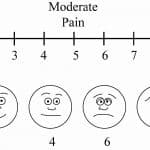Table of Contents
What is headache?

Headache is pain that occurs in your head, upper neck, or even your face. There are several different types of headaches. Migraines and tension headaches are the most common. Other types are cluster headaches and rebound headaches.
What is cluster headache?
A cluster headache is a rare type of headache. Cluster headaches typically start all of a sudden and occur once or more each day for a period of time. Often, they occur at the same time(s) each day. The period may last days or up to 12 weeks.
On average, each headache lasts about 45 to 90 minutes. The most common times for cluster headaches to occur are between 1 and 2 a.m. and 1 and 3 p.m., and around 9 p.m. Cluster headaches are more common in men than women.
How bad is my cluster headache?
Your clinic team will use this scale (see figure on right) to measure how bad your pain is.
Mild: Pain score of 3 or less on the VAS scale. This pain should not stop you from doing activities of daily life (like grocery shopping, laundry, cooking).

Moderate: Pain score of 4 to 6. This pain stops you from doing instrumental activities of daily life (preparing meals, managing money, shopping, doing housework, and using a telephone).
Severe: Pain score of 7 or higher. This pain is bad enough to stop you from even the most basic (self-care) activities of daily life like eating, dressing, getting into or out of a bed or chair, taking a bath or shower, and using the toilet.
How to manage mild cluster headache?
Keep track of your pain levels using Ankr (myAnkr web portal or the Ankr app). It will help you describe the pain to your doctor or nurse. You may be able to prevent cluster headaches by avoiding:
- Smoking
- Alcohol
- Foods (bacon, hot dogs, preserved meat) that trigger a cluster headache
- Cocaine
- High altitudes
- Strenuous activities
- Hot weather
- Hot baths
How to manage severe cluster headache?
Seek emergency care if you have any of these signs and symptoms:
- An abrupt, severe headache, often like a thunderclap
- A headache with a fever, nausea or vomiting, a stiff neck, mental confusion, seizures, numbness, or speaking difficulties, which can indicate a number of problems, including a stroke, meningitis, encephalitis or a brain tumor
- A headache after a head injury, even if it’s a minor fall or bump, especially if it worsens
- A sudden, severe headache unlike any you’ve had
- A headache that worsens over days and changes in pattern
What causes cluster headache?
The exact cause of cluster headaches varies and is not always known. Cluster headaches do not appear to be related to health conditions or diseases of the brain. Some of the triggers of cluster headaches include:
- Taking certain medicines, such as nitroglycerin.
- Certain cancers and cancer treatments
- Heavy smoking.
- Drinking alcohol.
- A change in your normal sleep pattern.
- Abnormal levels of certain hormones.
- Problems with your hypothalamus, which is the part of your brain that controls your body’s “biological clock.”
